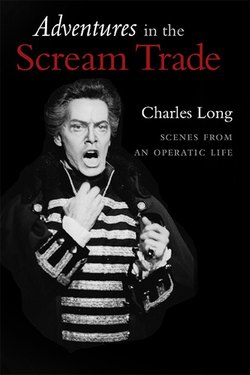Читать книгу Adventures In the Scream Trade: Scenes from an Operatic Life - Charles Long - Страница 8
На сайте Литреса книга снята с продажи.
Summer Stock
ОглавлениеThe previous year I had auditioned for Pittsburgh Civic Light Opera. At that time it was one of the largest summer-stock organizations in the country, playing in a huge, domed venue called the Civic Arena. They hired me on the spot, my first professional engagement under the auspices of one of the largest unions governing the show business industry—Actors Equity Association, aka “Equity.”
Summer stock schedules are brutal. A trial by fire. If you survive with your voice and health intact at the end of an eight-week run, you probably have the makings of a real pro. The company rehearses one show during the morning and afternoon and performs the show that was rehearsed the week before at night. Eight shows a week, two on Saturday and Sunday, with the “dark night” on Monday. That summer I worked six twelve-hour days every week, with just enough time for lunch and dinner breaks. It was an eye-opening experience for a boy who had never worked a day in his life, and it created a personal work ethic (for show biz, at least) that was to serve me well in the future.
The company employed forty full-time singers and dancers to perform chorus and small parts. Most were hired in from New York. The rest came from Pittsburgh. We formed a tight community, though some distance existed initially between the home-towners and the New York troupe. Each day started with music rehearsals for the singers and class for the dancers. In the afternoon, with scores and scripts in hand, we’d stage the upcoming show.
This is where I first developed a taste for dancers. Observing these lithe, long-legged sirens stretching like cats in heat was mesmerizing. It was impossible to ignore a hard-bodied, young woman performing a split against the wall, spreading her legs apart farther than seemed humanly possible, as another adopted a provocative pose at the bar, preening in front of the mirror. Remarkably, there were no long lines of suitors for these tantalizing temptresses. It took me about a week to figure out why.
This was the summer I learned about the huge homosexual faction in musical theater. Of the twenty men hired by the company—ten singers and ten dancers—only four of us were straight. As the weeks passed, two more came out of the closet. But, hey, being the minority in such circumstances had its benefits. As my grandmother used to say when somebody didn’t like what was being served for dinner, “More for the rest!”
In the ensemble during my second summer was a veteran performer named David Vosburgh. He was one of the nicest guys in the business and a short time later was lucky enough to play Roger Sherman in the original cast of 1776 on Broadway. David was openly and comfortably gay, as was his brother, of whom he said I reminded him. We hit it off and became friends. We bantered about each other’s sexual preferences, and soon it became a running comedy routine. Remember the caution about never bending over to pick up a bar of soap in a prison shower? Well, sharing a dressing room with eighteen guys covered in pixy dust was a lot like that. You had to watch your back.
To make a statement about my heterosexuality, lest there be confusion about my inclinations, I made a big deal out of taping a Playboy pinup to the outside of my locker. This brought derisive smirks from the Boys in the Band and lots of jeering and taunting. All in good fun.
The following night I arrived to an unusually quiet dressing room. I knew something was amiss but initially didn’t notice anything other than furtive glances from faces in mirrors. Then I saw them. Every locker and available wall surface was covered by gay pinup posters. A bevy of beefcake. A smorgasbord of schlong. I don’t remember what I said, but I’m sure I blushed. I don’t think I was even aware that gay pinups existed! I laughed and covered my eyes, which ignited squeals of laughter from bare-assed men dancing in the aisles. I was getting the third-class tour through the inner sanctum of one of the most steadfast subcultures of the biz. Sharing a dressing room with those guys was often more entertaining than the shows on stage. Homosexual men are not called “gay” for nothing.
In the orchestra were a few of my old friends from Steve Romanelli’s music studio. I would often drop in to the musicians’ lounge during intermission, where we’d swap stories about our various ends of the business. Sometimes the nostalgia ran thick. I missed hanging out with my pals—men who did manly deeds, chased women, got shit-faced at the local pub, and had a fist fight or two. But I’d made my choice, and there was no turning back. So, day after day, I waltzed my way through the land of the Sugar Plum Fairies, delighted that I had work.
I performed with a lot of talented luminaries those two summers: Patrice Munsel, Shirley Jones, Edie Adams, Bruce Yarnell, Chita Rivera, and many more. I did more than a dozen shows, lots of little roles, and developed a great love for musical theater. I met people who lived and worked in New York and was offered places to stay, should I decide to break out on my own. It was a training ground that bolstered my courage for the tough decisions ahead.
